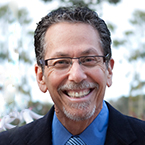
Ronald M. Evans, PhD, is professor and director of the Gene Expression Laboratory at the Salk Institute for Biological Studies in La Jolla, California, and an investigator with the Howard Hughes Medical Institute.
Dr. Evans received his bachelor’s degree in bacteriology from the University of California, Los Angeles (UCLA), in 1970 and his doctoral degree in microbiology and immunology, also from UCLA. He was a postdoctoral fellow at Rockefeller University in New York before joining the Salk Institute for Biological Studies in 1978.
Evans is an authority on hormones, both their normal activities and their roles in disease. In 1985 he elucidated the complete structure of the human glucocorticoid receptor, which led to the discovery of a nuclear receptor superfamily for steroids, Vitamins A and D, thyroid hormone, bile acids, fatty acids, and cholesterol metabolites. These hormones activate transcriptional networks that control sugar, salt, calcium, and fat metabolism, thereby influencing our daily health as well as treatment of disease. Nuclear receptors are primary targets in the treatment of many cancers including: leukemia (RAR), lymphoma GR), breast cancer (ER), prostate cancer (AR), and pancreatic cancer (VDR).
Evans’ studies revealed that PPARg and a closely related homologue (PPARd) control the storage and burning of fat, respectively, providing new insights into the treatment of obesity and adult onset diabetes (type 2 diabetes).
Recognitions he has received include: the Fred Koch Award (the Endocrine Society, 1999), First Bristol-Myers Squibb Award in Metabolic Research (2000), March of Dimes Prize in Developmental Biology, General Motors Cancer Research Foundation Alfred P. Sloan Medal, Keio Medical Science Prize (all 2003), Albert Lasker Basic Medical Research Award (2004), Grande Medaille D’Or of the French Academy of Science (2005), Dickson Prize (2005), Gairdner Award of Canada (2006), Harvey Prize in Medicine from the Technion Institute, Israel (2007), Albany Prize in Medicine (2007), Endocrine Regulation Prize, and the Wolf Prize in Medicine (2012), and a fellow of the AACR Academy (2014). He was the 1994 California Scientist of the Year.
He is a member of the National Academy of Sciences (1989), the American Academy of Arts and Sciences (1997), the National Academy of Medicine (2003), European Molecular Biology Organization and the American Philosophical Society (2007).